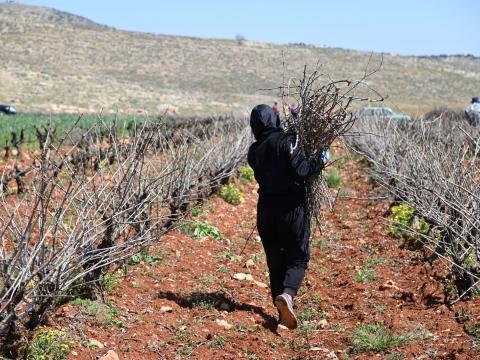Nothing can stop this mother.

The Beqaa comprises nearly 40 per cent of Lebanon's total area, with a Lebanese population estimated at one million residents and hosting the largest number of Syrian refugees in Lebanon. In this vast land, agricultural production is the primary source of livelihood.
Within the framework of UNDP Lebanon's response to the direct economic downturn impact on vulnerable people in Lebanon funded by Germany through KfW and implemented in partnership with World Vision, 220 women and men beneficiaries from different villages in the Beqaa participate in cash for work agricultural activities from trimming to the rehabilitation of agricultural areas, especially vines.
 Solange, 31, is taking part in the intervention to support herself and her family amidst the ongoing socio-economic crisis and coronavirus pandemic.
Solange, 31, is taking part in the intervention to support herself and her family amidst the ongoing socio-economic crisis and coronavirus pandemic.
"I have four little girls at home, and I have to take care of them," she said. “Working in plucking and growing vines is not a simple job. It requires a lot of physical effort and strength to monitor the growth of the vines until harvest time, but I am excelling in it,”she added.
Growing vines is the most common agricultural production in the Beqaa. Almost all of Lebanon's wineries grow their vines there.
“Ever since I was a little girl, I always used to see everyone in my village work in the vines, so it feels normal for me to do so as well," Solange said.
Because of her skills and hard-work, Solange was assigned as a supervisor on her team.
“Monitoring and pruning vines is a delicate job which requires attention, and everything affects the quality and the result if not done carefully," she added.
 "The intervention offers a great deal. Besides providing us with a decent amount of money, I can get home to prepare lunch and help my girls with their homework," Solange said.
"The intervention offers a great deal. Besides providing us with a decent amount of money, I can get home to prepare lunch and help my girls with their homework," Solange said.
Nothing is impossible for this young mother who is determined to provide a decent life for herself and her girls no matter what it takes.
"There is no difference between women and men here, we all do the same tasks and work the same hours and get paid equally, which is encouraging, and that's how it should be," she concluded.
